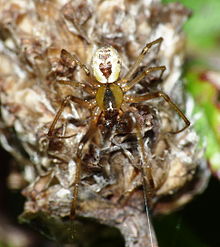Kochiura
Kochiura is a genus of comb-footed spiders that was first described by Allan Frost Archer in 1950.[2]
| Kochiura | |
|---|---|
 | |
| Male Kochiura aulica | |
| Scientific classification | |
| Kingdom: | Animalia |
| Phylum: | Arthropoda |
| Subphylum: | Chelicerata |
| Class: | Arachnida |
| Order: | Araneae |
| Infraorder: | Araneomorphae |
| Family: | Theridiidae |
| Genus: | Kochiura Archer, 1950[1] |
| Type species | |
| K. aulica (C. L. Koch, 1838) | |
| Species | |
|
8, see text | |
Species
As of May 2020 it contains eight species, found in Europe, Africa, Brazil, Chile, and Iran:[1]
- Kochiura attrita (Nicolet, 1849) – Chile, Juan Fernandez Is.
- Kochiura aulica (C. L. Koch, 1838) (type) – Cape Verde Is., Canary Is., North Africa, Europe, Turkey, Caucasus, Iran
- Kochiura casablanca (Levi, 1963) – Chile
- Kochiura decolorata (Keyserling, 1886) – Brazil
- Kochiura ocellata (Nicolet, 1849) – Chile
- Kochiura olaup (Levi, 1963) – Brazil
- Kochiura rosea (Nicolet, 1849) – Chile, Juan Fernandez Is.
- Kochiura temuco (Levi, 1963) – Chile
Formerly included:
- K. episinoides (Levi, 1963) (Transferred to Chrosiothes)
In synonymy:
- K. bucculenta (Nicolet, 1849) = Kochiura rosea (Nicolet, 1849)
- K. chiloensis = Kochiura ocellata (Nicolet, 1849)
- K. foliacea = Kochiura rosea (Nicolet, 1849)
- K. gracilis (Keyserling, 1884) = Kochiura rosea (Nicolet, 1849)
- K. levipes = Kochiura attrita (Nicolet, 1849)
- K. opima = Kochiura rosea (Nicolet, 1849)
- K. rubicunda = Kochiura rosea (Nicolet, 1849)
- K. virgulata = Kochiura ocellata (Nicolet, 1849)
gollark: π = 3 = e, so it's not a HUGE problem.
gollark: Oh, also pi.
gollark: Square roots?
gollark: It doesn't actually include any numbers.
gollark: Time to... rewrite my eternally unfinished notes system™ in these, somehow.
See also
References
- "Gen. Kochiura Archer, 1950". World Spider Catalog Version 20.0. Natural History Museum Bern. 2020. doi:10.24436/2. Retrieved 2020-06-26.
- Archer, A. F. (1950). "A study of theridiid and mimetid spiders with descriptions of new genera and species". Museum Paper, Alabama Museum of Natural History. 30: 1–40.
This article is issued from Wikipedia. The text is licensed under Creative Commons - Attribution - Sharealike. Additional terms may apply for the media files.